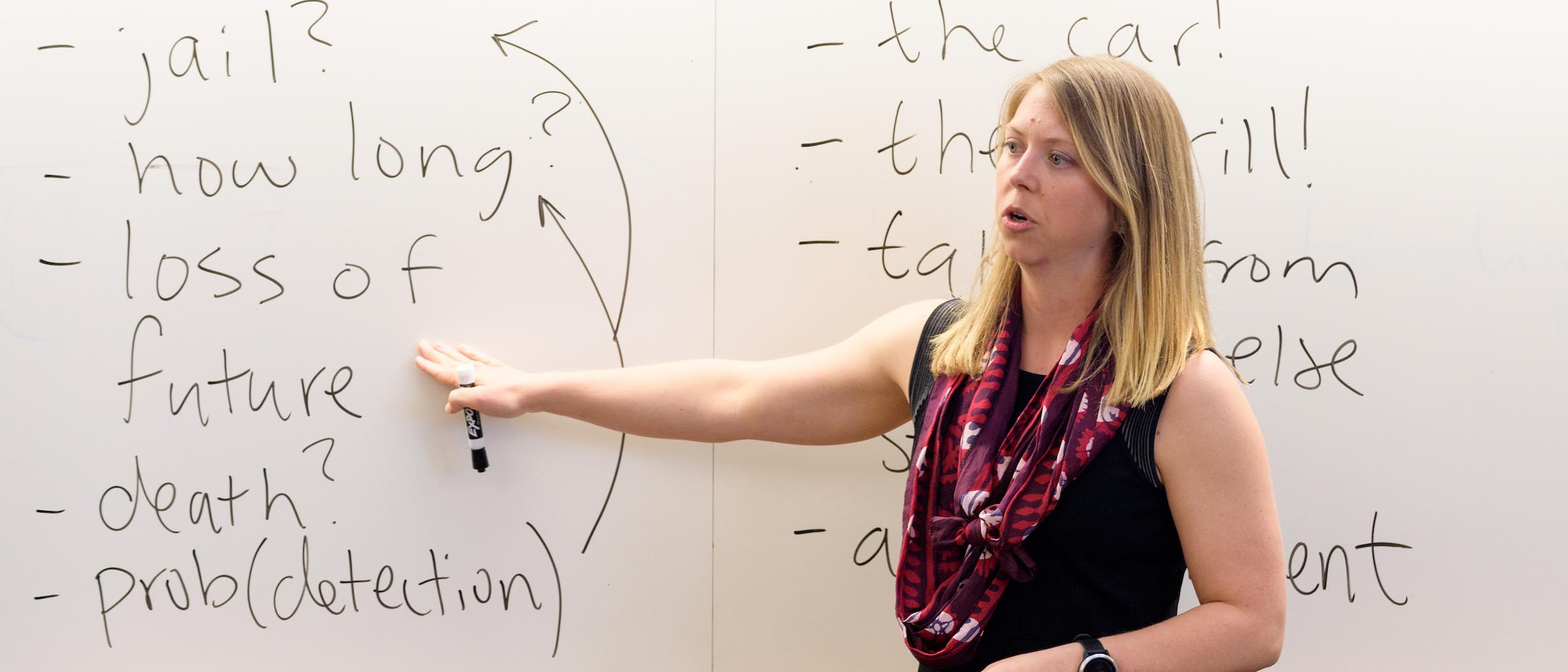
At some business schools, research and teaching can be mutually exclusive, with certain faculty focusing on the former while others focus on the latter. At Purdue University’s Mitchell E. Daniels, Jr. School of Business, however, research and teaching are often intertwined. In fact, having active faculty research shapes the curriculum and the student experience in a profound way.
One example is an ongoing research study on ethics education that could become a national model. According to Kelly Blanchard, a clinical associate professor of economics and associate dean for undergraduate programs, the research began in 2018 with support from the Blake Family Ethics Fund. Along with Blanchard, participating faculty are Brian Chupp, a clinical assistant professor in the organizational behavior and human resources (OBHR) area, and Cara Putman, a clinical assistant professor of law, communication and ethics.
“All you have to do is look at the headlines in the Wall Street Journal or Financial Times on any given day to see examples in living color of companies that weren't able to self-regulate by behaving ethically,” Putman says. “As a business school, we stand at a unique intersection where we can help train the future business leaders on what it means to be ethical, giving them tools and frameworks on how to make more ethical decisions.”'
The researchers began by looking at what could be done to incorporate the teaching of ethics into the Daniels School curriculum. “What we landed on first was giving students an understanding of their own ethical perspective,” Blanchard says. “How do these students naturally respond to different kinds of ethical dilemmas?”
More than 2,500 students from selected courses across campus, including 954 business school undergraduates, were tested in a series of interventions (ethics lectures, reflective essays, and personal ethics inventories) to determine their impact on four different stages of “ethical maturity” – awareness, application, analysis, and action.
“We found that students in general don't have a very robust understanding of their own ethical perspective, so what we’re doing now is helping them define their own ethical standards and perspectives so that when they do face these dilemmas, they have some idea of what solutions they can use to reach an ethical outcome,” Blanchard says.
“As a business school, we stand at a unique intersection where we can help train the future business leaders on what it means to be ethical, giving them tools and frameworks on how to make more ethical decisions.”
Cara Putman, Clinical Assistant Professor of Law, Communication and Ethics
Somewhat surprisingly, the researchers also found that limited ethics training actually makes students less ethical in the sense that as they become more aware of varying ethical perspectives, they default to “any ethics is good ethics,” Blanchard says. “However, repeated exposure to ethics education has a stronger and more statistically significant effect on ethical maturity.”
To ensure that outcome, Blanchard, Chupp and Putman are expanding their research and launching a longitudinal study that will track students from their first year through graduation as they work across core courses that incorporate ethics content.
“There are a number of ways that we can explain ethical dilemmas to students,” Blanchard says. “Some of them are related to case studies, some of them are related to particular historical events and how you might evaluate those from an ethical perspective. Some of it is just asking them questions like, ‘Can you explain an ethical dilemma? What makes it a dilemma? Can you share a personal experience that you've had with an ethical dilemma?’ And then we continue to build on each iteration of exposure to ethics that we have.”
Making the course content understandable to students can sometimes be a challenge, however.
“We use words like consequentialism and deontology, but no one knows what they mean,” Putman says. “How do you make that practical? How do you take it out of the ivory tower and turn it into an automatic part of the process anytime someone's making a business or personal decision? What are the different frameworks they can use when they're confronted with a decision that's going to have ethical implications?”
Learn how to more effectively teach ethics at the undergraduate level.
According to Chupp, ethics education should permeate a business school’s curriculum. “A lot of other universities approach ethics as a competency that can be checked off a list, but we want to weave it into the fabric of our undergraduate program and create a repository of case studies, assignments, seminars, and guest speakers for faculty to incorporate the topic into their coursework,” he says.

“A lot of other universities approach ethics as a competency that can be checked off a list, but we want to weave it into the fabric of our undergraduate program.”
Brian Chupp, Clinical Assistant Professor of Organizational Behavior and Human Resources
“Whether it’s in accounting, economics, OBHR, marketing, or another field of study, our goal is to incorporate an ethical tone and perspective in each of the common courses so that the majority of students will have multiple touches across the curriculum that specifically incorporate the perspective of ethical decision making.”
Ultimately, the researchers expect that an emphasis on ethics in the curriculum will allow business students to develop not just an understanding and appreciation of the topic, but also the confidence and competence to display ethical leadership in business. “What we would like to see over time is an increase in students’ ability to understand different ethical perspectives and then apply and act on them,” Blanchard says.
Let us tell you about the innovative ways we are evolving education at Purdue's business school.